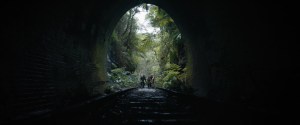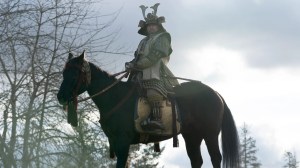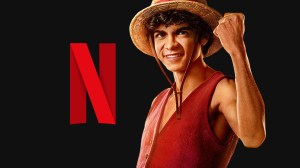This week sees the release of Greenland, a new disaster movie starring Gerard Butler (300) and Morena Baccarin (Gotham, Deadpool), and directed by Angel Has Fallen filmmaker Ric Roman Waugh. The film centers on a family’s trek to safety upon finding out that an extinction-level comet is just days away from hitting the Earth. They have to try to find their way to one of a small number of underground bunkers meant to house enough people to keep humanity from being wiped out of existence. It’s a treacherous trip, though, and obviously there are millions of people vying for those thousands of spots.
Videos by ComicBook.com
At the core of it all is a family story — including recently-divorced parents that give it something of an ’80s family movie vibe. That, according to Waugh, was a big part of what appealed to him in the screenplay.
Waugh joined ComicBook.com to talk about the film, which releases to select theaters and video on demand platforms today. There are mild spoilers ahead for the film.
At this point, between this one and your last one and your next one, is it safe to assume that where Gerard Butler goes, you go too?
I hope so. We’d known each other for a number of years before doing Angel Has Fallen together, and you always wonder if you’re going to have chemistry or not once you’re in the saddle. It was very apparent to us right away, and what I like about Gerry is, one, he’s just a good human being, and I consider him a brother. But there’s a professional collaboration between us where we will definitely push each other to get the best out of one another, yet there’s also a trust factor that we both have in each other.
Once we had done Angel Has Fallen, we were really looking to go again. We didn’t want to do another big summer, tentpole action kind of a movie. We wanted to look for a different type of genre to play with, and I’d always been fascinated with disaster movies, and horror movies and sci-fi. But I wanted to do my version, from the inside-out, that was much more from an intimate point of view.
When I read Greenland, it just blew my mind. I immediately called the producer, Basil Iwanyk, and said, “Look, I would love to do this movie. I think Gerry is absolutely perfect for it.” He agreed. He was a big fan of Gerry as well. And we got Gerry to read over the weekend, and we were off to the races.
So, once we did the second picture together — yeah, I’m hoping to, by answering your question in a long-winded way — I’m looking to do, if we can, 20, 30 movies together. The great collaborations through our business have never really been one-off, they’ve been a body of work. So, hopefully that’s our trajectory.
This is a movie where obviously the stakes are global, but it’s a very, very personal and intimate movie. How important is it to you as a filmmaker, to be able to use that kind of laser focus?
I think when Gerry and I were talking about different genres. We were big fans of Logan, as great as all the X-Men franchise was, that Logan was such a more intimate portrayal from the inside-out. We talked about Children of Men, a huge, high-concept kind of sci-fi, but was very much from a personal point of view. A Quiet Place. I can keep giving these types of references.
But that’s what Greenland really meant to us, that it was a way to really have two monsters in the movie, the obvious one of an impact that could create an extinction event. But the other one to us was humanity itself. It was: Are people capable of coming together when it’s life or death, or will they turn on one another? We loved the gray of that, and that it was really about humanity itself.
It was also a movie about hope, and about a love story. Hopefully the metaphor of a love story of our society was rooted into this couple that are miles apart, and are on the brink of divorce, trying to rekindle their marriage, let alone their love. And thinking they have some time to sort it out together, and then time is taken away, and it’s how life or death has a way of knocking the rust off. Watching this family come together as one, and realizing that all at the end of the day we have is each other and our love for one another.
I think that it’s a good message for the world that we’re living in today. The irony of it is that nobody knew about COVID, a pandemic, anything when this movie was filmed, when this movie was edited. It was already tested. We were in the final throes of post-production when someone were like, “Wait, what?” And then your knee-jerk reaction is, “Oh my God, we have a disaster movie in the middle of a disaster.”
Then you start to really think about it, and you watch the movie back, and you get emotionally gripped by these performances and the message of it, and you realize it’s the exact movie that will translate with people today. Because it is about hope, and it is about love, and it is about our own survival, and how we can overcome any obstacle. Like we have before with wars, and world wars, and other pandemics, and rocks hitting the Earth as well.
There’s a scene where people are being loaded on and off transfers with moments to spare. Was it important to show “the helpers,” where the people are letting them off instead of running for their lives?
I think everybody understood that the message was about humanity, and how we will come together as one. And I know that the US Air Force loved the message of the movie and how it portrayed their Air Corps. That the US Air Force and some of our other branches are not just war-fighting machines. But the US Air Force is very involved with the humanitarian effort, and evacuation of hurricane Katrina, and Haiti, and Africa, and so many other disaster-ridden places, disaster areas.
So when they came aboard and did the movie with us, we loved it. And I told them my biggest thing is I want to show that our men and women in uniform are mothers and fathers and family members themselves, with their own stakes involved. The fun part of it for me is that 90% of the men and women in uniform in the movie are all enlisted people that are real, that’d never been on camera before in their lives.
We only really cast 10% of our military characters, just because of some of the bigger scenes that they’re portrayed in. But for the majority, they were all real, and we told people, “Do it real. Do it how you would do it. Talk how you would talk to people. Don’t do it the bullshit movie way. Do it the real way, how you would do it.” And they’re acting as they would with one another.
You also had Holt McCallany, who is one of those dudes who, he just elevates everything he’s in.
Yeah, yeah. I agree.
When you’re casting for a role that’s not huge, do you have to sit there and think, “Okay, do we want to get somebody who’s familiar and who’s going to distract? Or do we want to go small with this?”
There was never going to be stunt casting. I would say Scott Glenn, outside the immediate family of Morena Baccarin and Gerard Butler, is probably obviously the most famous person that we bring to screen. But when you’ve got Hope Davis, and David Denman, and Merrin Dungey, and Andrew Bachelor, and just all of these great, great character actors and people that are stars in their own right. Holt was the Beast in Shot Caller, my movie that we did before Angel. Just love him to death.
It was fun to put him in this role, because Holt comes from such a realistic point of view with all of his characters that he’d play it real. And to me, it never feels like stunt casting unless you’re doing stunt performances as well, to try to show off who you put in the movie. Look at the way he comes in in the movie, he basically just comes out of the dark like a raving madman, trying to get this runway clear.
It’s just about the way we meet Scott Glenn, coming into the room and the first thing out of his mouth is an argument. We wanted everything to feel real life, and I think you get away with putting great actors in movies that are very recognizable, but putting them in such a way that people don’t have the time to sit there and think, “Oh, there’s a stunt casting role.” They’re all playing real people, in real performances.
It’s funny, because of the nature of these kind of episodic little beats, where they end up someplace, something happens, and then they have to travel, it felt to me a little bit like Spielberg’s War of the Worlds.
Yeah, War of the Worlds was one of them. I love Spielberg’s constraint of having all the money in the world, and yet he never left the perspective of Tom Cruise. In fact, one of my favorite scenes in that movie is this horrible situation as a parent where he has one little girl that’s about me taken by these people, and his son wants to go fight the aliens and join military, and the son goes over the hill to fight the front, and you never go with the son. And you have to live that horror of what his son is going through from a parent’s eyes.
I think A Quiet Place was another one of, “Have I seen those monsters before? Yeah, a lot. I’ve seen them in all kinds of movies.” They weren’t really that unique to me, but it was the unique perspective of being with that family. It was Children of Men. Those are the benchmarks that I wanted to look at and see the engineering of staying in that intimate portrayal, but also giving the audience the big perspective and the big visceral ride that they’re anticipating.
So, there’s always a danger doing the inside-out movie versus say, 2012, or Armageddon, or Independence Day, Deep Impact. The movies that are from the outside-in, where you’re cutting to the White House, you’re cutting to the news people, you’re cutting to the people around the world. We wanted to live it through the family’s point of view and never, ever break that point of view.
Was that part of what went into the decision to have that final sequence be over a crackling, staticky radio with anonymous people, as opposed to having it be either a recurring character or the government or the media?
Yeah. When we started looking back at World War II, and we started looking at different types of disaster times that have happened, shortwave radio has been the one … It’s so funny, we live in such as modern technology world, right? And it’s funny, the minute you take all that away, people resort back to smoke signals. So, shortwave radio was one way that we’re still connecting. And we listened to a lot of that.
I remember, which is obviously not shortwave radio, but even when 9/11 happened, and listening to all the phone calls. Or the Boston bombing, and listening to all the phone calls and the walkie-talkies and the police radios. We loved the idea that you’re with this family, and you’re wanting to know what happened to the rest of the world, and you have a sense of hope with them as the bunker door is opening. That you’re hearing all these radio transmissions, but never cutting to them, but you get the sense that there are other areas of the world that could have possibly survived, and it’s about this new day and age.
Was it intentional that throughout the movie, it was very intimate, but it also felt very global in the sense that even in those last few seconds, I don’t think I heard an American voice check in outside of our guys?
No, because we were saying the conceit of that Americans were all being evacuated, who they can save from the one spot. And then we also didn’t want it to be just an American movie. We wanted to show it in a very international presence. There was always talks about that there would have been this kind of evacuation mode by the United States and some of the close allies, but Russia would have had theirs, the far East would have had theirs, the South Americans would have had theirs. People would’ve come together to figure out how to survive on their own, and they’d have these different pockets.
So it not only felt international, but it’s what our world is. We live in a global society. The pandemic is no different. People always say the pandemic is very much like the one in 1918. Well, yes and no. People didn’t travel like they do now, so that pandemic was very centralized. This one, look how fast it spread globally. So we wanted the same sense of that, this would have been a global catastrophe, and we wanted that global sense to give the film as well, as you stay in the unique perspective of this American family.
Did keeping it really focused on the family help you to place it both in the now, but also avoid some of those thornier issues of the modern world, where it’s tempting to have someone on the periphery politicizing decency?
Yeah. It did. Well, I think it didn’t just give us the constraint, it gave us the license to stay true to what we wanted to do. Which was to tell this movie from the outside-in, and really live in that scope and be okay with seeing it from their perspective. And it did. It was liberating to not have to feel like we had to service the programmer kind of feelings of what we’ve seen before, but do our own unique version of it. Without destroying what people are trying to come see, a big, kick-ass action ride, but hopefully have something that makes us have an emotional response as well, at the same time.








